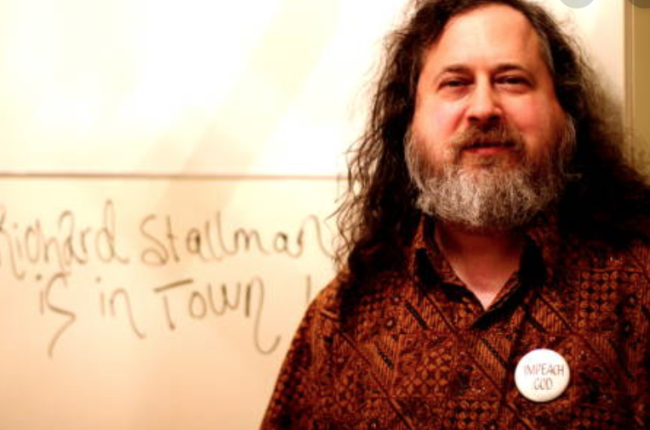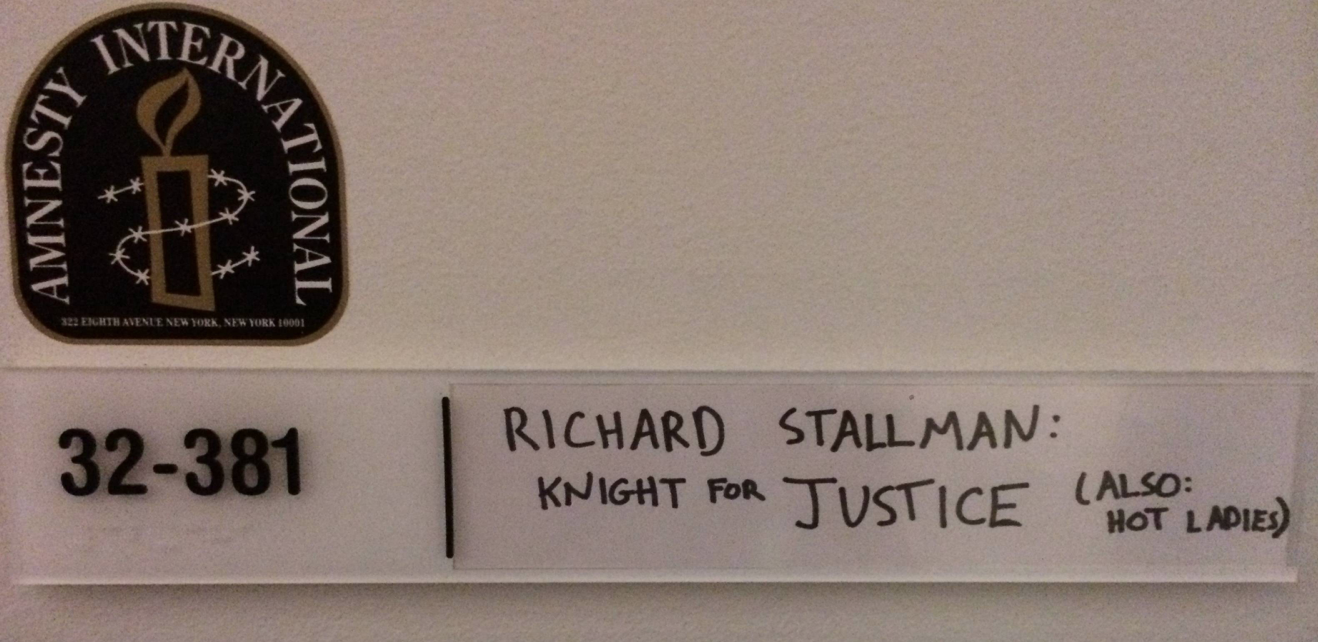You have /5 articles left.
Sign up for a free account or log in.

Richard Stallman
Stallman.org
The most recent academic casualty in the Jeffrey Epstein case is Richard Stallman -- so he says.
Stallman, a visiting professor in Massachusetts Institute of Technology’s esteemed computer science and artificial intelligence laboratory, or CSAIL, announced in a brief post to his website this week that he’s stepping down immediately “due to pressure on MIT and me over a series of misunderstandings and mischaracterizations.”
He wrote in a slightly longer email to CSAIL that has since been circulated online that “misleading media" coverage "totally mischaracterized my statements.” Headlines say “that I defended Epstein,” Stallman wrote, but “nothing could be further from the truth. I’ve called him a ‘serial rapist’ and said he deserved to be imprisoned.”
Yet many who read Stallman’s recent comments about the case on the CSAIL Listserv said he came across loud and clear, and that was the problem.
Others have raised issues about Stallman’s character and leadership abilities that go beyond Epstein, the late sex offender and financier who donated to MIT and Harvard University and who socialized with a number of prominent scientists -- even after his 2008 conviction for soliciting a minor for prostitution.
Epstein died by suicide this summer in jail as he faced additional sex trafficking charges. But he’s still impacting the lives of academics who engaged with him, and some who didn’t. In MIT’s Media Lab, for example, Joi Ito resigned as director this month amid pressure for concealing his financial ties to Epstein. Two other academics in the lab, Ethan Zuckerman and J. Nathan Mathias, had previously stepped down in protest of Ito’s actions.
Selam Gano, a robotics engineering MIT graduate, arguably set Stallman’s departure in motion last week when she published a post on Medium called “Remove Richard Stallman and Everyone Else Horrible in Tech.” Her occasion for writing was an email she’d seen, originally posted to the CSAIL Listserv.
Stallman, that email’s author, was apparently writing in response to a female student’s invitation to an Epstein-related protest held Friday. Specifically, Stallman took issue with a reference to Marvin Minsky, the late MIT cognitive scientist with whom an Epstein accuser has testified Epstein forced her to have sex.
“The term ‘sexual assault’ is so vague and slippery that it facilitates accusation inflation: taking claims that someone did X and leading people to think of it as Y, which is much worse than X,” Stallman wrote in his message. “The reference reports the claim that Minsky had sex with one of Epstein’s harem. Let’s presume that was true (I see no reason to disbelieve it). The word ‘assaulting’ presumes that he applied force or violence, in some unspecified way, but the article itself says no such thing. Only that they had sex.”
Stallman continued, “We can imagine many scenarios, but the most plausible scenario is that she presented herself to him as entirely willing.”
Gano wrote that there are “so many things wrong” with Stallman’s email that she didn’t know where to begin. She included a photo of Stallman’s office door (below), identifying him as a “knight for justice” and “hot ladies,” and said that he’d long been known for making inappropriate comments.
 In another example, added to her post later, Gano shared a CSAIL email in which Stallman apparently said that he asked to be screened by women at airport security checkpoints because “it’s not fair that only gays get to enjoy this.” (In a separate comment, Stallman apparently tried to backtrack, saying he was joking and that “straight males may not actually like being felt up by women in that sort of context.”)
In another example, added to her post later, Gano shared a CSAIL email in which Stallman apparently said that he asked to be screened by women at airport security checkpoints because “it’s not fair that only gays get to enjoy this.” (In a separate comment, Stallman apparently tried to backtrack, saying he was joking and that “straight males may not actually like being felt up by women in that sort of context.”)
As Gano’s post gained attention, others began to speak out against Stallman. Some pointed to his website, where he has since 2003 advocated for legalizing sex with minors and child pornography. In one post from that year, for example, in response to a proposed censorship law in Britain, Stallman wrote, “I think that everyone age 14 or above ought to take part in sex, though not indiscriminately. (Some people are ready earlier.) It is unnatural for humans to abstain from sex past puberty, and while I wouldn't try to pressure anyone to participate, I certainly encourage everyone to do so.”
In another post from 2003, Stallman quoted then-federal appeals court nominee William Pryor's argument that if choice in sexual partners was guaranteed by the Constitution, then “adultery, necrophilia, bestiality, possession of child pornography, and even incest and pedophilia” also would be, as well. Stallman’s analysis was that Pryor was “probably mistaken, legally -- but that is unfortunate. All of these acts should be legal as long as no one is coerced. They are illegal only because of prejudice and narrow-mindedness.”
In another example from 2015, Stallman argued against a British politician's pitch for greatly increased surveillance of communications to identify pedophiles, saying, in part, "They are not talking finding and imprisoning men that have sex with children." Rather, he said, "They are talking about finding and imprisoning men who have or redistribute copies of images that depict sex with children, or perhaps with adolescents labeled as children; they want to imprison them because there is some chance they would have sex with children, or with adolescents. I don't believe that should be done at all."
Following Stallman’s MIT departure, the Free Software Foundation announced that he’d resigned as its president and from its Board of Directors, as well. Stallman founded the organization in 1985.
Just as the male professors who rationalized their relationships with Epstein have sparked greater conversations about gender and ethics in academe, Stallman’s critics have cautioned that free software, open source and greater tech’s gender issues are bigger than him.
Software engineer Sarah Mei wrote on Twitter, for instance, that “Richard Stallman is the reason I didn’t start contributing to open source (then called ‘free software’) in the '90s. I’m not the only one. He and his followers pushed out a whole generation of female developers, just at that critical time when open source adoption was widening.”
Or, as Gano wrote, “Why do we wait until it becomes bad and public and unbearable and people like me have to write posts like this? Why do we ponder the low enrollment of female and minority graduate students at MIT with one hand and endorse shitty men in science with the other? Not only endorse them -- we invite them to our campus where they will brush shoulders with those same female and minority students.”
And why, she asked, “do we excuse people simply because they are ‘geniuses’?”
MIT referred a request for comment to an email that Daniela Rus, director of CSAIL, sent to the lab upon Stallman's resignation. "In the weeks ahead, we will work with him to come up with a transition plan," Rus wrote. "We thank him for his technical contributions to the lab, to the free-software movement, and to the wider computer-science community over the decades."
Rus added that recent "events have also prompted me and other senior leadership at the lab to focus on having a discussion on how we can improve the ways we respectfully work with one another in this community. This includes ongoing conversations about the future of the CSAIL-related Listserv."









